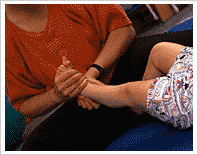
Through the Life Span: The Touch search Institute, University of Miami, has completed many research studies on massage therapy. These researchers have found evidence that massage has significant benefit for babies, children, adults, and elderly persons. Massage therapy has been shown to enhance growth in premature babies in the hospital, calm aggressive adolescents and help kids with Attention Deficit Disorder. Elderly persons in nursing homes have responded to massage with decreased agitated behaviour. The Touch search Institute, University of Miami, has completed many research studies on massage therapy. These researchers have found evidence that massage has significant benefit for babies, children, adults, and elderly persons. Massage therapy has been shown to enhance growth in premature babies in the hospital, calm aggressive adolescents and help kids with Attention Deficit Disorder. Elderly persons in nursing homes have responded to massage with decreased agitated behaviour.
On the Job:
Corporations and other institutions are discovering "" <>that massage therapy programs for employees pay off. Job stress has been identified as a serious health care issue that relates to decreased productivity, decrease job satisfaction, increased work related injury, errors and absenteeism. Research reported in the Financial Times 1, and in Massage Therapy: The Evidence for Practice 2 show that massage is a good tool for reducing work stress.
Stress, Depression, and Immunity:
Massage therapy studies have shown positive results in boosting the body's own natural cellular immune response, decreasing pain by pumping up the body's levels of endorphins and decreasing the blood levels of cortisol which is a hormone related to stress. These beneficial results are proving helpful for people with critical illnesses like cancer and HIV infection and for those who suffer from Chronic Fatigue Syndrome and Fibromyalgia.
Sport:
Athletes, coaches, and professional trainers use massage. Massage therapy is used at sporting event to help athletes performance and to help prevent injury. Massage may improve muscle recovery and decrease muscle soreness after exertion. Athletes also benefit from the therapy's positive effects on heart rate and blood pressure, and the general relaxation response that reduces anxiety and improves mood.3
1 - Financial Times (1992)
2 - Rich, G. (Ed.). (2002). Massage Therapy: The Evidence for Practice. Toronto,ON
3 - Sports Medicine, (2005);35(3):235-56
|

